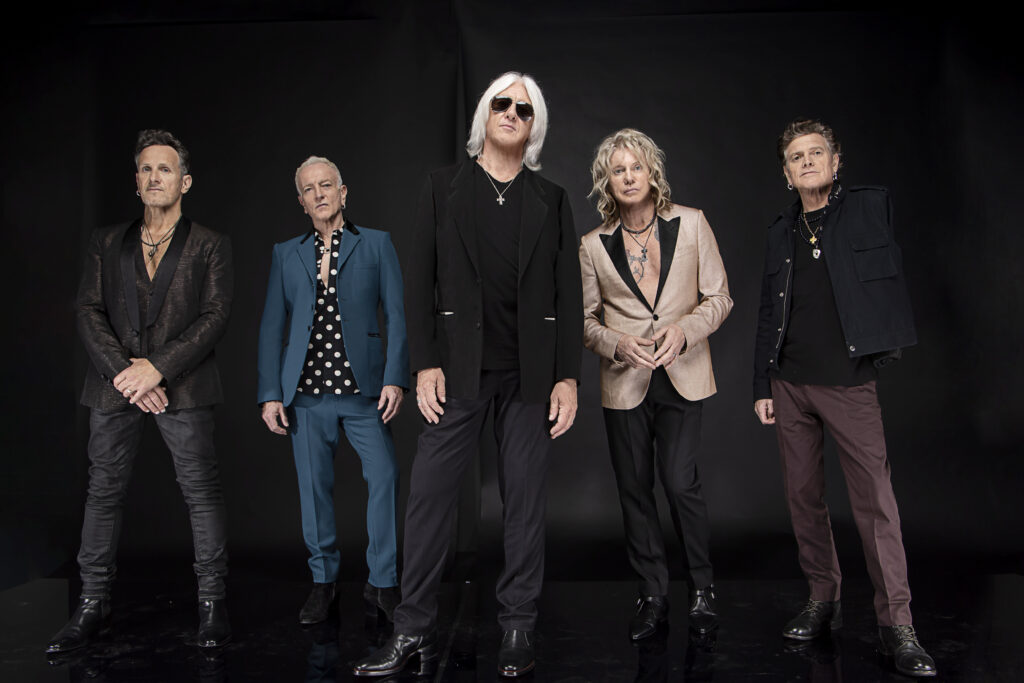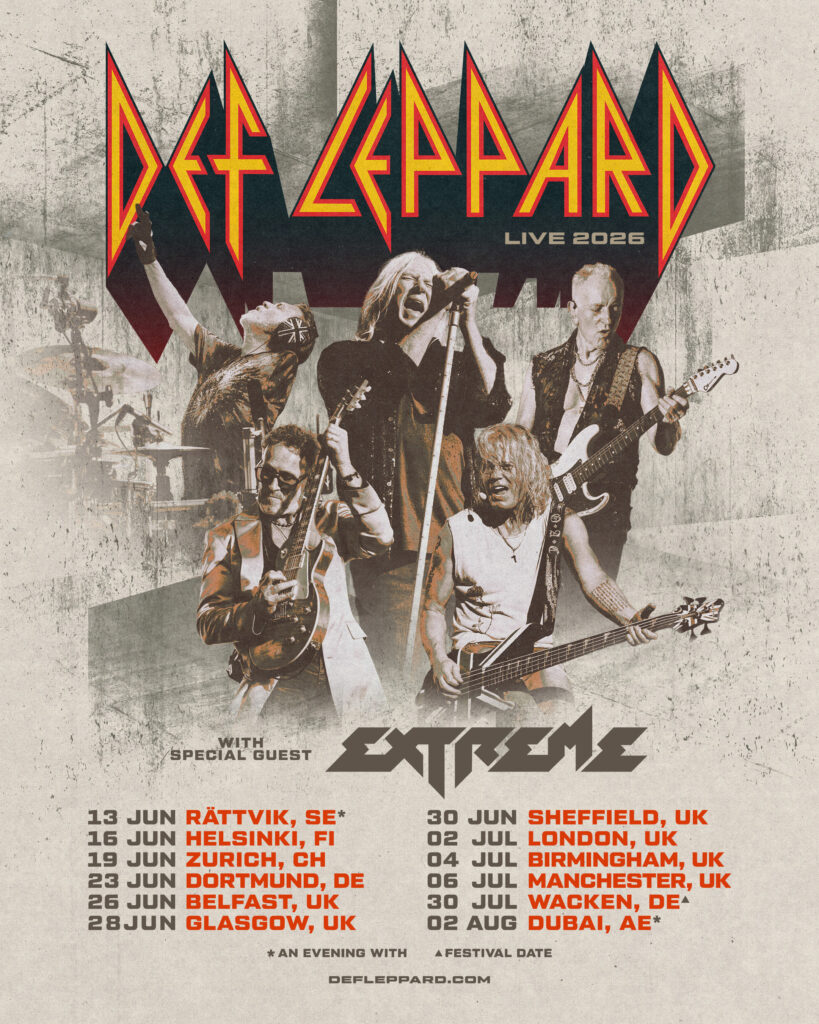via Telegraph
In a windowless underground room backstage at the Seminole Hard Rock Hotel and Casino in Miami, Florida, Def Leppard are working their way through the pre-show meet and greet. The five musicians are gussied up in hard rock suiting: denim, leather, tattoos, chains, rock’n’roll hair, three bare chests.
Security guards efficiently usher through a parade of fans who have paid top dollar for concert tickets that include the chance to meet their English heroes. Where “meet” means posing in front of the band for 15 to 20 seconds, positioned just-so on the target image from the cover of 1983’s Pyromania album.
There’s no handshaking, fist-bumping or touching of any kind. Not since Covid. And certainly not since guitarist Viv Campbell, 63, had a stem-cell transplant, the latest stage in the Northern Irishman’s treatment for the Hodgkin’s lymphoma he’s lived with since 2013 (his cancer is now in remission).
These fans – who come in all shapes, sizes, sexes and previous-tour T-shirts – are entirely happy with this arrangement, eager to shell out $1,200 (£890) for a photograph with a band most of them have followed for the best part of four decades (“I’ve been waiting since 1984 for this!” one exclaims). Also entirely happy are five blokes who, in their medley of still-staunch Yorkshire, Derbyshire, Cockney and Irish accents, cheerfully rattle through quick-fire banter with 77 fans in 19 minutes.
Def Leppard, in case you need to be reminded, have sold around 110 million albums; Hysteria alone sold 20 million copies in 1987, and was beaten only by Michael Jackson’s Thriller. They have also had more than their fair share of tragedy: drummer Rick Allen losing his left arm in a car crash 40 years ago, and the 1991 alcohol-related death of original guitarist Steve Clark. But unusually for a group of their vintage, Def Leppard are still going strong – and getting along. They don’t just still travel together. They share a dressing-room, all five of them, every night.
“It’s not like we’re the Monkees and we wear matching pyjamas and go on holiday together,” clarifies Campbell with a grin. “But we have a healthy respect for each other, and we like each other enough that we can co-exist in that way. When we travel, it used to be a tour bus, now it’s a charter jet. But it’s still submarine duty – we’re still in a metal tube together for a few hours. So you’ve got to get along and you’ve got to enjoy it. If it wasn’t fun, I don’t think we’d be doing it.”
Miami is the penultimate stop on a summer tour of America that, for a band who are still a box-office draw, marks a momentary, strategic scaling back. Fewer stadiums and arenas, more state fairs and casinos. Still, tonight’s gig is in a venue so rock’n’roll in its tourist-friendly credentials that it’s guitar-shaped, the instrument’s body – which houses 638 luxury rooms and suites – stretching vertically into the Florida sky.
Playing in a guitar-shaped hotel seems appropriate for a band so rock’n’roll that, for them, 1984’s This Is Spinal Tap is more documentary than comedy film. “In the Rock of Ages video,” says guitarist Phil Collen, 67, of their 1983 single, “I’m wobbling my a–e to the camera. And when the movie comes out, f—ing Nigel Tufnel [the fictional band’s lead guitarist] is doing the same move. So really, it’s got my a–e in it. I think that’s cool!”
The setting will be very different this weekend, when Def Leppard will converge on Essex from their multimillionaire piles in Dublin (singer Joe Elliott), Yorkshire (bassist Rick Savage), New Hampshire (Campbell) and California (drummer Rick Allen and Collen) to headline the Radio 2 in the Park festival. Did a hard-rocking guitar group who emerged, alongside Iron Maiden and Saxon, out of the 1980s new wave of British heavy metal ever think they’d become a Radio 2 band?
“Well, seeing as Radio 2 is now a grown-up Radio 1, I would hope so,” says the irrepressibly chipper Elliott, 66. “If they’re going to play Oasis and Blur, and Bon Jovi and Queen and Bowie, why not? We’ve had hit singles – 17 of them. We’re not Golden Earring with the one, or Argent with the two. We’ve had a few. So I would hope we would be on Radio 2.”
Despite their embrace by the UK’s most listened-to radio station, Def Leppard are yet to have the sort of hipster renaissance enjoyed by peers like AC/DC. Do they care?
“I don’t, because we’re having success,” answers Elliott, who is already looking ahead to a busy 2026: a month-long residency in Las Vegas in February, and a summer arena tour of Europe. “There’s a bit of a remnant of the fact that there was a certain amount of… not jealousy, but p—-d-off-ness from music journalists in the early 1980s that we ‘sold out’ to the States. Which we didn’t. But once one person says it, everybody else follows. All of a sudden, we weren’t hip.”
He dates the turning point to the period “after Rick had his accident”, on the A57 outside Sheffield, on December 31 1984. In a remarkable show of defiance, and of commitment to the band he’d joined on his 15th birthday, Allen vowed to learn to drum with one arm. “His first real gig back, other than some Irish warm-ups, was Monsters of Rock [in August 1986]. There was an acceptance then.
“Then, a year later, Hysteria came out, and it’s a number one album in the UK. There came a point where we had so many hits, [the music press] had to accept the fact that there are people out there that like us. Then the NME would reluctantly come out to interview us. And I can say this now, because they don’t exist anymore [as a print magazine], but f— ’em. They’d much rather put Bauhaus on the cover, who’d sold one record.”
For this band of working-class brothers, the 1980s were an intense time. In 1982, they had to fire founding guitarist Pete Willis on account of his alcoholism, replacing him with Collen. Two and a half years later came Allen’s accident. Six years after that, they lost Clark, a member since 1978, although Dio and Whitesnake veteran Campbell, hired as the new guitarist, quickly slotted in.
In between all that, during a September 1983 concert in El Paso, Texas, Elliott made an off-the-cuff remark about “greasy Mexicans”. In a mark of how big Def Leppard had become, it turned into a major diplomatic incident; two months later, after the conclusion of the European leg of the tour, the singer had to fly to California to apologise in a specially convened press conference.




